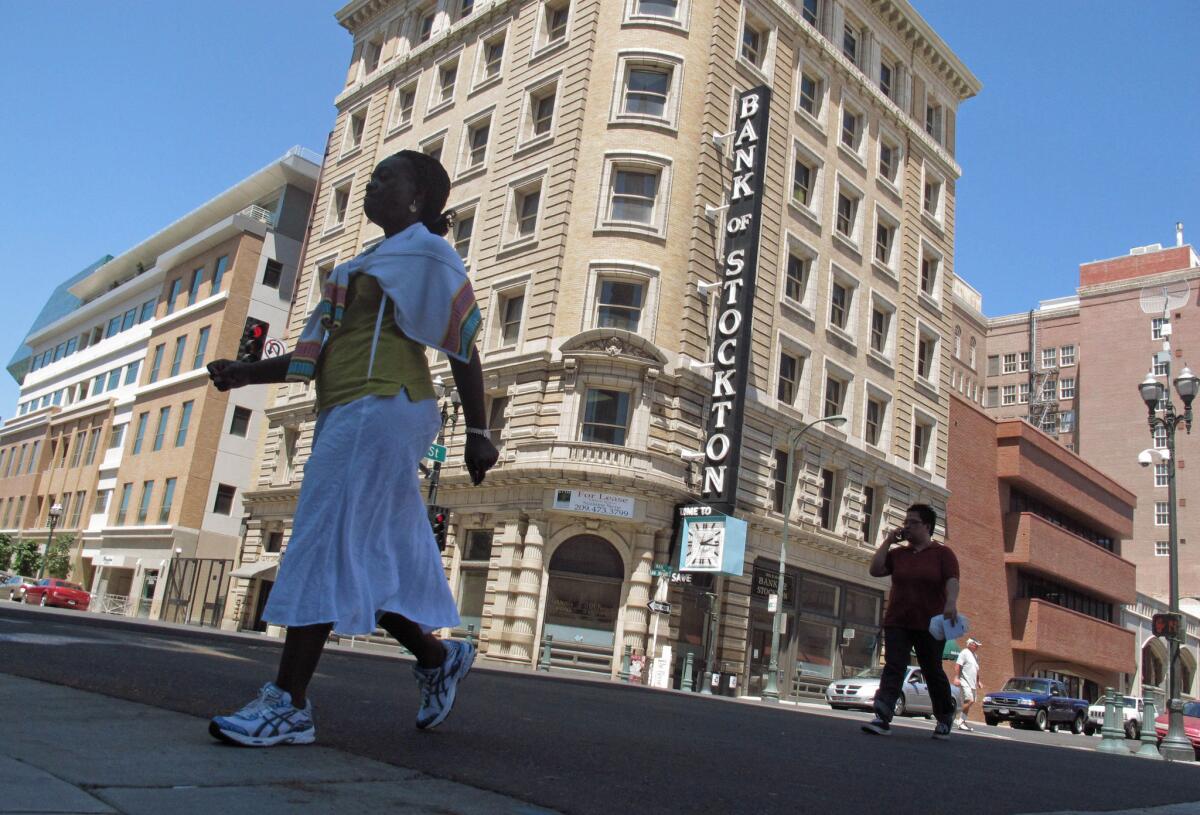Judge approves Stockton bankruptcy plan; worker pensions safe

A federal bankruptcy judge approved the city of Stockton’s bankruptcy recovery plan, allowing the city to continue with planned pension payments to retired workers.
The case was being closely watched after the judge ruled this month that the city’s payments to the California Public Employees’ Retirement System could be cut in bankruptcy just like any other obligation.
If Judge Christopher M. Klein had rejected Stockton’s plan and forced the city to slash its payments to CalPERS, it could have opened the door for other cities struggling with escalating pension costs to follow suit.
Stockton officials had argued that they couldn’t afford to cut pensions or to create another retirement plan for city employees. They said employees would leave Stockton for other cities offering retirement benefits through CalPERS.
CalPERS had said that if Stockton left the state retirement system, the city would immediately owe it $1.6 billion -- far more than the city’s current bill to the pension plan.
On Thursday, Klein said that workers had already taken hits in the bankruptcy. He said Stockton’s salaries and benefits for workers had been higher than those at other cities, but that workers had agreed after the bankruptcy filing to take big cuts, including eliminating the free medical care they received in retirement.
“It would be no simple task to go back and redo the pensions,” Klein said Thursday.
He added, “This plan, I’m persuaded, is the best that can be done.”
Klein said that rejecting the plan after two years in court and tens of millions of dollars in legal and other fees would have put the case back to “square one.”
The city’s plan slashes payments to other creditors, including Franklin Templeton, an investment firm that holds more than $36 million in bonds the city used to borrow money. Franklin had asked Klein to reject the city’s plan so that it could get more of its money back.
Franklin’s financial expert used the city’s own projections to show that it would soon be paying CalPERS nearly 20% of general tax revenues – up from 11% today.
Franklin had argued that the increasing cost of pensions would put the city at risk of another bankruptcy.
But Klein said Thursday that Stockton’s plan for paying creditors over the years was adequate and passed all legal tests.
Kurt Wilson, the city’s manager, said after the ruling that it “confirms that Stockton is fiscally stable and on the road to recovery.”
“We are going to have stability that impacts our ability to attract and retain employees,” he said.
CalPERS Chief Executive Anne Stausboll praised Klein’s decision.
“The City has made a smart decision to protect pensions and find a reasonable path forward to a more fiscally sustainable future, she said. ”We will continue to champion the integrity and soundness of public pensions – to protect the benefits that were promised to the active and retired public employees who participate in the CalPERS pension plan.”
In recent years, pensions have been a political hot potato in Stockton. Overly large pensions approved by city officials for employees are among the reasons Stockton found it could no longer pay its bills, critics say.
Beginning in the 1990s, the city and employee unions negotiated such high salaries and benefits that pay packages were more than 25% above what other cities were offering, said Kathy Miller, a Stockton city councilwoman.
Police and firefighters could retire at 50, while other city employees could retire at 55. All employees received free medical care in retirement with plans that didn’t require co-pays.
There were bonuses “for almost everything imaginable,” Miller had explained in a video she created in 2012 to explain why the city had been forced to seek bankruptcy protection. “If you drove the front of a fire truck, if you drove the back of a fire truck, if you got a degree or certificate, even if it was for something that had nothing to with your job.
“Stockton employees made pension spiking into an art form, using overtime and add pays in their final working years to secure much larger pensions for the rest of their lives.”
Stockton’s promised pensions for police and fire employees are some of the highest paid in the state, according to an analysis by Franklin’s expert. The city is now paying the equivalent of 41% of police salaries to CalPERS for future pensions – an amount that will increase to 57% in five years.
Twitter: @MarcLifsher
Twitter: @MelodyPetersen








